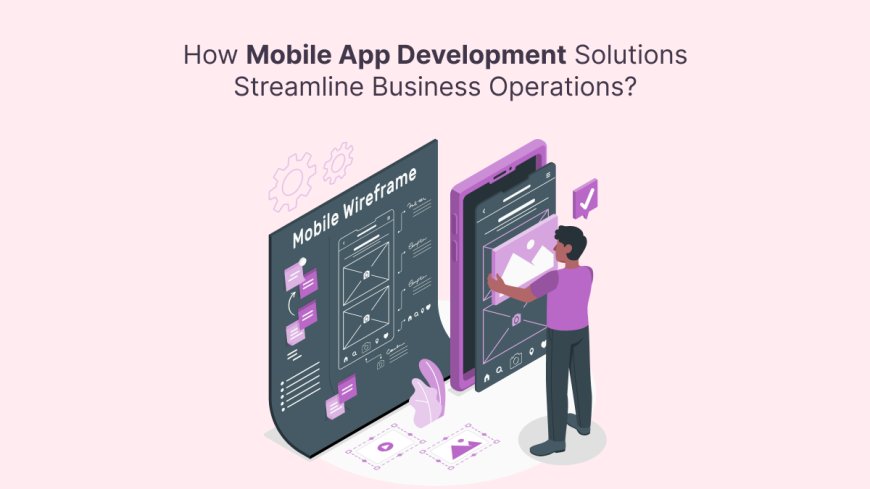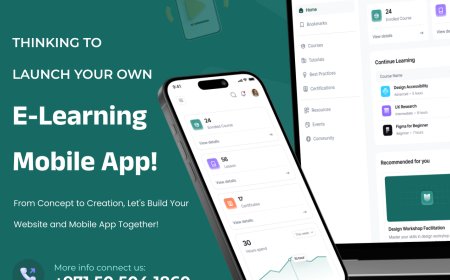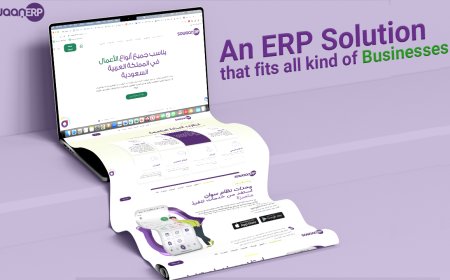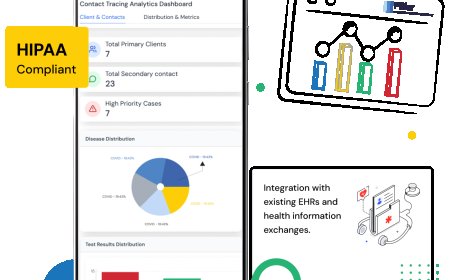How Mobile App Development Solutions Streamline Business Operations?
Discover how mobile app development solutions streamline business operations by automating tasks, improving workflows, and boosting productivity.

In todays fast-paced and highly competitive market, businesses are always looking for smarter ways to manage their operations and deliver better services. One of the most effective tools that have transformed how companies operate is mobile app development solutions. With smartphones becoming an essential part of everyones life, mobile apps have made it possible for businesses to streamline processes, improve communication, increase productivity, and reduce manual tasks. Whether its managing inventory, interacting with customers, or tracking performance in real time, mobile apps are playing a vital role in optimizing business operations.
Understanding the Importance of Streamlined Operations
Every business, whether small or large, needs efficient operations to succeed. From managing employees and handling customer requests to processing payments and monitoring logistics, smooth workflows are essential. When operations are unorganized or overly dependent on manual methods, businesses face delays, errors, and higher costs.
Streamlining business operations simply means making them more efficient, faster, and less error-prone. Mobile app development solutions are helping achieve this by automating routine tasks, enabling real-time communication, and integrating with existing systems to ensure everything runs seamlessly.
Mobile apps not only improve internal processes but also enhance the overall experience for customers and employees. They offer convenience, accessibility, and instant access to data, all of which contribute to smoother day-to-day functioning.
How Mobile Apps Help Automate Repetitive Tasks
Many business operations include tasks that are repetitive and time-consuming. These might involve entering data, sending emails, creating reports, or scheduling appointments. Mobile apps can automate these tasks, saving both time and effort for your team.
For example, a field service company can use a mobile app to automatically assign jobs to technicians based on their location and availability. Instead of manually calling or emailing employees, the app handles the entire scheduling process. This reduces delays and allows employees to focus on more important tasks.
Automation also reduces human errors that often occur when tasks are done manually. By standardizing processes through mobile apps, businesses can ensure better accuracy and consistency in their operations.
Real-Time Communication and Collaboration
Communication is a crucial part of any successful business. Delays in sharing information, missed messages, or unclear instructions can lead to confusion and mistakes. Mobile apps make real-time communication easier, faster, and more effective.
Team members can use apps to chat, share documents, send voice messages, or update task statuses instantly. Whether employees are working remotely, on the field, or in different departments, mobile apps ensure everyone stays connected.
For example, project management apps allow teams to track progress, assign responsibilities, and share updates in one place. This improves transparency and helps team members stay aligned with the companys goals.
Moreover, better communication means faster decision-making. Managers can quickly approve requests, make changes, or respond to queries without waiting for long email chains or in-person meetings.
Simplified Data Management and Access
Handling data manually can be overwhelming, especially as businesses grow. Whether it's customer information, sales records, or employee logs, storing and retrieving data through traditional methods is often inefficient.
Mobile apps can simplify data management by offering centralized access to all important information. Employees can enter, update, and retrieve data from anywhere, anytime. Cloud integration ensures that the latest data is always available in real-time.
For instance, sales representatives can use a mobile CRM app to instantly access customer details before a meeting or input deal updates while on the go. This eliminates paperwork and allows businesses to keep their data updated at all times.
With proper permissions in place, apps also ensure data security and privacy, giving businesses better control over sensitive information.
Efficient Inventory and Supply Chain Management
For businesses dealing with physical goods, managing inventory and supply chains is a key part of operations. Traditional inventory methods often involve paperwork and manual counting, which are not only slow but prone to errors.
Mobile apps can completely change this process. Warehouse staff can scan barcodes using smartphones, update stock levels in real-time, and get alerts when inventory is low. This makes the entire supply chain more responsive and organized.
Delivery apps help track shipments, assign drivers, and notify customers about order status. By having everything managed through one platform, businesses can avoid overstocking, missed deliveries, or incorrect shipments.
Moreover, app-based analytics provide insights into inventory trends, allowing businesses to plan purchases, forecast demand, and avoid unnecessary expenses.
Improved Customer Service and Engagement
One of the most visible ways mobile apps streamline business operations is through better customer service. Whether its answering queries, resolving issues, or guiding users through a purchase, mobile apps make interactions quicker and easier.
Apps can include features like chat support, FAQs, appointment booking, and feedback forms, all of which reduce the need for phone calls or in-person visits. Customers get faster responses, and businesses can handle more queries with fewer resources.
For example, a salon app can allow customers to schedule appointments, select services, and make payments directly from their phones. This minimizes wait times, improves service speed, and makes the whole process smooth for both staff and customers.
When customers are happy with how easy it is to interact with your business, they are more likely to return and recommend your services to others.
Accurate Reporting and Performance Monitoring
Tracking performance and analyzing data is necessary for making smart business decisions. But compiling reports manually is time-consuming and often lacks real-time accuracy.
Mobile apps solve this by collecting and displaying performance metrics automatically. Business owners and managers can view dashboards that show sales numbers, employee productivity, customer feedback, and moreall in real time.
These insights help identify areas of improvement, spot opportunities, and address problems quickly. For example, a restaurant owner can monitor which menu items are most popular or see how each branch is performing, all from a mobile device.
Apps can also generate customized reports, send automatic alerts when performance drops, and even suggest recommendations based on historical trends. This saves time and improves decision-making at every level of the business.
Remote Access and Flexibility
One of the biggest advantages mobile apps bring to business operations is remote access. In todays hybrid and remote work environment, employees need tools that allow them to stay productive outside of the office.
Mobile apps provide just that. Employees can clock in, manage tasks, communicate with teams, and access company resources from anywhere. This flexibility not only boosts employee satisfaction but also ensures that work doesnt come to a halt due to location barriers.
For businesses with field workers or delivery teams, mobile apps make it easy to track activities, record job completion, and update statuses in real time. This leads to better accountability and smoother workflows.
Integration With Other Business Systems
Mobile app development solutions dont work in isolationthey often integrate with other business systems like accounting software, CRM tools, ERP platforms, and marketing automation tools. This integration allows for a seamless flow of data across departments.
For example, when a customer places an order through an app, the inventory is updated, the invoice is generated, and the CRM reflects the purchaseall automatically. This interconnected workflow reduces manual entry, prevents errors, and improves operational efficiency.
With everything connected through mobile apps, businesses can enjoy a smoother, smarter, and more efficient system.
Keeping Up With Industry Trends
Technology is always evolving, and mobile app development keeps businesses updated with the latest trends. Features like AI, machine learning, voice commands, and augmented reality are now being included in apps to further improve efficiency and user experience.
For example, AI chatbots can handle thousands of customer queries at once, and predictive analytics can suggest what products to restock. By adopting these modern features through apps, businesses can stay ahead of the curve and remain competitive.
Keeping operations aligned with technology trends not only boosts performance but also positions the business as innovative and customer-focused.
Read more: How Mobile App Development Services Boost Customer Engagement?
Conclusion
Mobile app development solutions are no longer a luxurytheyve become a necessity for businesses aiming to streamline their operations. By automating tasks, enabling real-time communication, simplifying data handling, and improving customer service, mobile apps bring order and efficiency to everyday business processes. They help reduce costs, minimize errors, and increase productivity, all while offering better control and flexibility.
As businesses grow and adapt to digital expectations, having a reliable mobile app becomes essential for success. Partnering with an experienced on demand app development company can make all the difference in designing customized solutions that not only improve operational flow but also enhance user experience. Embracing the power of mobile apps ensures your business stays agile, competitive, and ready to meet the challenges of tomorrow.
Frequently Asked Questions
How do mobile apps improve internal business workflows?
Mobile apps improve workflows by automating routine tasks, making communication faster, and providing real-time updates. This helps employees stay organized and reduces the time spent on manual processes.
Can mobile apps help with employee management?
Yes, apps can assist in tracking employee attendance, assigning tasks, monitoring performance, and even managing payroll. This makes workforce management easier and more accurate.
What are the benefits of using mobile apps for customer service?
Mobile apps offer quick access to support, allow users to submit feedback, and provide self-service options like FAQs or appointment booking. This leads to faster resolution times and happier customers.
Is it possible to monitor business performance through a mobile app?
Absolutely. Many apps come with dashboards that display sales, user activity, customer feedback, and other key metrics in real time. This helps managers make informed decisions quickly.
How do mobile apps integrate with other software systems?
Most modern apps can be integrated with tools like CRMs, accounting software, and inventory systems. This allows for smooth data sharing and helps avoid duplicate work or manual errors.









































